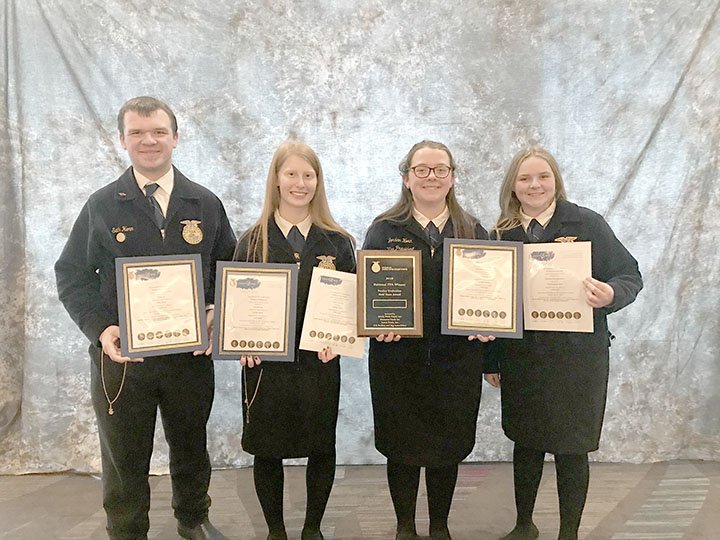FARMINGTON -- When it comes to western Washington County, FFA poultry judging teams know what they are doing.
The Farmington FFA Poultry Judging team of siblings Jordan Horn, Seth Horn, Katelynn Horn and member Emily Spatz finished in second place at the national competition in October.
Lincoln's FFA Poultry Judging Team brought home the national championship in fall 2017.
The Farmington students won the state competition in April out of 24 teams and this qualified them to advance to the National FFA Convention & Expo held the week of Oct. 22 in Indianapolis, Ind. Only the state winner is able to compete on the national level.
In Indiana, Farmington's team competed against 39 teams in the 2018 FFA Poultry Judging Career Development Event. They had to judge poultry on several different levels.
"It's a combination of looking at eggs, live birds and poultry products and evaluating them for quality," said Seth Horn, a senior at Farmington High School.
Jordan explained that the team looks for defects, such as missing parts and disjointed bones, "anything that's not good for a customer to have."
For example, one part of the judging is a plate with chicken nuggets, wings and drumsticks. The students looks for any defects in those chicken products, any burned areas or missing breading.
They also must look for any foreign objects placed in the products. Things such as pennies and feathers have been found in chicken products during a judging competition, Jordan said.
Along with judging poultry, the students take a written test on a manual that is several inches thick. The test is challenging because the manual is 180 pages long but only 30 questions are on the test.
Jordan and Emily, both freshmen at the University of Arkansas majoring in poultry science, finished a four-year career together as members of the Farmington FFA Poultry Judging team. They finished in third place at the state competition their freshman and sophomore years, were in second place their junior year and then topped off their senior year with first place at state and second place at nationals.
Over the four years, the young ladies competed in 43 different contests and placed in the top three 30 times. Their other team members during the four years included Joseph Welsch, Autumn Gregg, Jeffery Jones, Madyson Barnum, Seth and Katelynn
For FFA event competitions, team members are ranked as individuals and each FFA chapter enters the contest ranked as a team. Team scores are an accumulation of individual scores.
At the national convention, Emily Spatz had the third highest individual score for poultry judging. Jordan finished sixth and Seth Horn came in eighth place individually. Katelyn Horn was in the top third.
The Horn siblings are the children of Ronnie Horn, Farmington High FFA sponsor and agriculture teacher. They live on a farm with laying hens and broilers.
"We eat a lot of chicken at our house," Jordan said.
Seth said being on the same team with his sisters and all living under the same roof can be an advantage.
"When we were not doing homework or sleeping, we were studying," he said.
Horn was proud of his Farmington team. He said they worked hard to be competitive at the state level and then at the national level. Horn said the kids were somewhat disappointed they did not finish in first place but they were close.
"They've worked thousands of hours," Horn said. "It's all worth it."
He points out Northwest Arkansas is the toughest region in the state for poultry judging teams.
"Our state contest is very tough. If you win there, you'll be competitive at the national level," Horn said. "In Arkansas, there are six or eight schools that are good every year."
Community on 12/12/2018
